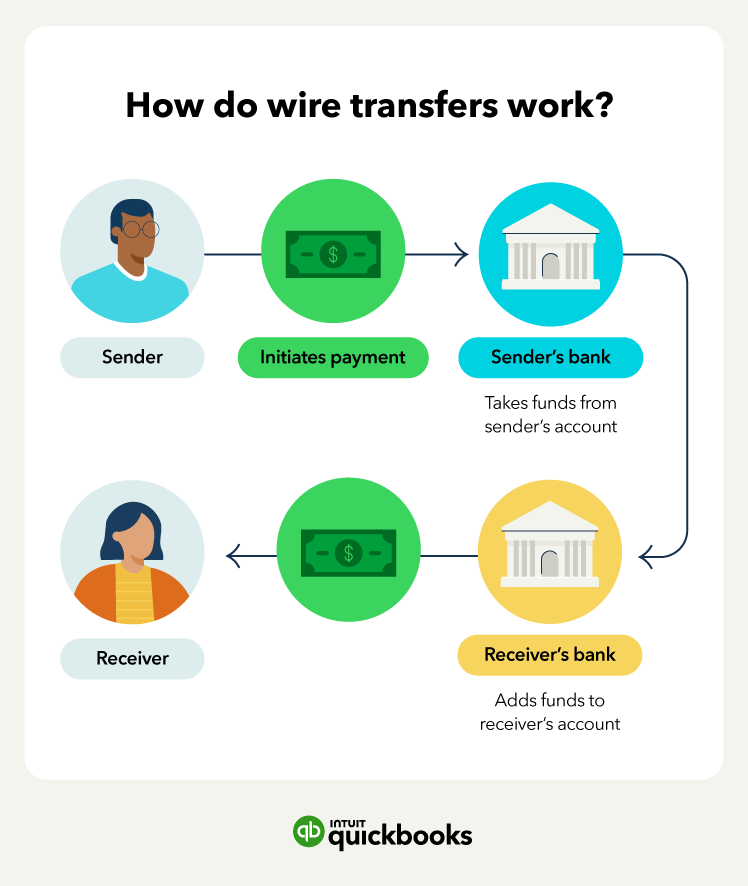Choose the best payment setup for your business
Choosing between ACH vs. wire transfers for your business will depend on your goal. If you’re looking for flexible payment options, QuickBooks Payments can accept various payment types, including debit cards, credit cards, ACH payments, and eChecks.
QuickBooks can help you get your money when you need it, with options to receive payment instantly or the next day. Online invoicing, mobile payment processing, and recurring payments make it easy to get paid and focus on other aspects of your business.
*We provide third-party links as a convenience and for informational purposes only. Intuit does not endorse or approve these products and services, or the opinions of these corporations or organizations or individuals. Intuit accepts no responsibility for the accuracy, legality, or content on these sites.*
*QuickBooks and Intuit are a technology company, not a bank. Banking services provided by our partner, Green Dot Bank, Member FDIC.*
*QuickBooks Money: QuickBooks Money is a standalone Intuit product that includes QuickBooks Payments, and currently does not connect with other QuickBooks products such as QuickBooks Online (and QuickBooks Checking), QuickBooks Self-Employed, or GoPayment. Intuit accounts are subject to eligibility criteria, credit, and application approval. Banking services provided by and QuickBooks Visa Debit Card are issued by Green Dot Bank, Member FDIC, pursuant to a license from Visa U.S.A. Inc. Visa is a registered trademark of Visa International Service Association. QuickBooks Money Deposit Account Agreement applies. Banking services and debit card opening are subject to identity verification and approval by Green Dot Bank. Money movement services, including Same Day Deposit, are provided by Intuit Payments Inc., licensed as a Money Transmitter by the New York State Department of Financial Services.*
*Same Day Deposit: Same Day Deposit allows you to have near-real time deposits sent to you on a predetermined daily schedule (up to 3x a day, Monday through Sunday, including holidays). Same Day Deposit is an additional service offered by QuickBooks Payments subject to eligibility criteria, for no extra fee for QuickBooks Money users. QuickBooks Money payment request fees apply for ACH and card transactions. Once batched, eligible deposits will be sent to your QuickBooks Money account, and will be available in up to 30 minutes. Transactions between 2:15-3:00 pm PST are excluded and transactions after 9:00 pm PST will be available for deposit the following morning. Deposit times may vary for third party delays.*
*QuickBooks Checking account: Banking services provided by and the QuickBooks Visa® Debit Card is issued by Green Dot Bank, Member FDIC, pursuant to license from Visa U.S.A., Inc. Visa is a registered trademark of Visa International Service Association. Green Dot Bank operates under the following registered trade names: GoBank, GO2bank and Bonneville Bank. Registered trade names are used by, and refer to, a single FDIC-insured bank, Green Dot Bank. Deposits under any of these trade names are deposits with Green Dot Bank and are aggregated for deposit insurance coverage up to the allowable limits. Green Dot is a registered trademark of Green Dot Corporation. ©2022 Green Dot Corporation. All rights reserved. QuickBooks products and services, including Instant Deposit, QuickBooks Payments, Cash flow planning / forecasting are not provided by Green Dot Bank.*
*Instant Transfer: Instant transfer is an additional service offered by QuickBooks Checking subject to eligibility criteria, including delayed eligibility for new users. The service carries a 1.5% fee. Deposit times may vary due to third party delays. Limits apply. See Deposit Account Agreement for details.*
*QuickBooks Online Payroll & Contractor Payments: Money movement services are provided by Intuit Payments Inc., licensed as a Money Transmitter by the New York State Department of Financial Services, subject to eligibility criteria, credit and application approval. For more information about Intuit Payments Inc.’s money transmission licenses, please visit https://www.intuit.com/legal/licenses/payment-licenses/*



















